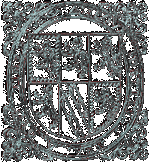 |
Mortlake
in Surrey, is barely a mile north of Richmond Park and as the
crow flies is only six miles from Westminster, the center of London.
Up until the early part of the nineteenth century, between the river
Thames and the church, there had stood a rambling old house once owned
by Rowland Dee the father of John Dee.
Sometime before 1570 John Dee took up his abode with his mother, in
a house belonging to her at Mortlake. It was an old rambling place,
standing west of the church, between it and the river.
Dee added to it by degrees, purchasing small adjoining tenements,
so that at length it comprised laboratories for his experiments, libraries
and rooms for a busy hive of workers and servants. Mrs. Dee occupied
a set of rooms of her own.
Here Dee made his home. Its nearness to London and the Queen's places
of residence - Greenwich, Hampton Court, Sion House, Isleworth - was
obviously a great advantage, and the journey to and from London was
almost invariably made by water. |
It suited Elizabeth greatly that her personal adviser and astrologer
was always close at hand.
After Dee's death the house passed through many interesting phases
of existence, being first adapted by Sir Francis Crane for the Royal
tapestry works, where, encouraged by a handsome grant of money and
orders from, the usually more than thrifty, King James. Suits of hangings
of incredibly fine workmanship were executed under the watchful eye
of Francis Cleyne, a "limner," who was brought over from Flanders
to undertake the designs.
At the end of the eighteenth century, a large panelled room with red
and white roses, carved and coloured, was still in existence. Early
in the nineteenth century the house was used for a girls' school,
being kept by a Mrs. Dubois.....
Nothing of the old building now remains, perhaps only an ancient gateway
leading from the garden towards the river.
|
|
This publication
intends to raise above the known event horizon into the light of
a new dawning amazing and unimagined aspects of at least one historical
event.
In 1571, after a tedious
journey abroad, into the duchy of Lorraine on some mysterious errand,
Dee fell dangerously ill at Mortlake and Elizabeth sent down two
of her own physicians, Doctors Atslowe and Balthorp, to attend him.
Lady Sidney was also despatched with kind, gracious, and "pithy"
messages from the sovereign. Delicacies, "divers raretiess," were
supplied from the royal table to supplement his mother's provision
for the invalid.
The Queen seems to have felt a special obligation to look after
him, as she had sent him on some mission of her own, which probably
we shall not be far wrong in thinking connected with Dee's alchemistic
experiments.
The Queen, when out riding in Richmond Park with her lords and ladies,
would sometimes pass through the East Sheen Gate, down the hill
towards the river, and would stop at the house between Mortlake
Church and the Thames, desiring to be shown the latest invention
of her astrologer, or the newest acquisition of his library.
On the afternoon of one such windy day in march, 1576, she arrived
at a somewhat unlucky moment, for Dee's young wife, after only one
year of marriage, had just died, and not four hours earlier had
been carried out of the house for burial in the churchyard opposite.
Hearing this, Elizabeth refused to enter, but bade Dee fetch his
famous glass and explain its properties to her outside in the field.
Summoning Leicester to her assistance, she alighted from her horse
by the church wall, was shown the wonderful convex mirror, admired
the distorted image of herself, and finally rode away amused and
merry. So this mysterious shadowy figure that was Dee's first wife
fades from history, and no-one even knows her name.
|

SILVER
COPY OF
THE MORTLAKE ESCUTCHEON |
|
|





